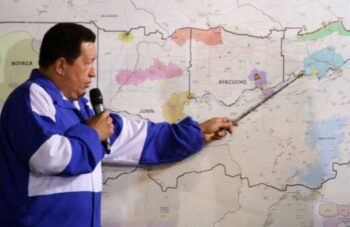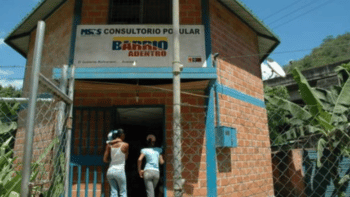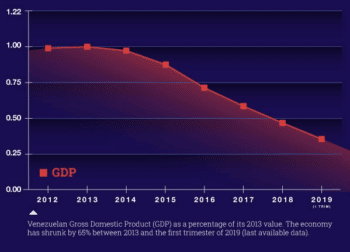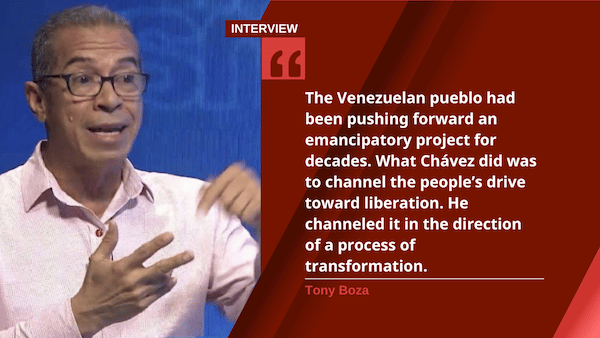Tony Boza is a Venezuelan economist, a National Assembly member (for the PSUV), and a well-known television personality. In Part I of this interview, Boza contrasts the nature of the Venezuelan economy when Chávez came into power and the changes he promoted by channeling oil profits toward working-class needs. He also examines the impact of the U.S. blockade by sharing some tangible figures. In Part II, Boza explores the economic policies currently applied in Venezuela.
Venezuelanalysis: Can you help us understand the situation of the economy when President Hugo Chávez came to power in 1998?
Tony Boza: During the last 100 years, 98% of the revenues coming into the country were generated by oil sales. This was mediated by the Venezuelan state, which holds the property of the country’s subsoil. In class terms, this means that the Venezuelan bourgeoisie has been (and still is) particularly parasitic, because its key business was (and still is) capturing the country’s oil profits.
There is a very interesting document that dates back to 1939-40. It’s called the “Fox Report,” which was an investigation carried out by U.S. researchers and promoted by the U.S. Congress. The Venezuelan government authorized this research initiative.
The results are surprising, considering the origin of the report! In fact, it presents a very true picture of Venezuela’s economic formation. The bottom line is that the Venezuelan bourgeoisie discovered the way to appropriate the country’s rent through two mechanisms: capturing the rent in origin and capturing the rent in its destiny.
What does this mean? The Venezuelan bourgeoisie partnered with non-Venezuelan capital in the oil business. That way, they captured part of the rent “directly.” That’s what we call capturing the rent in origin. Then there is another mechanism: building a consensus that will favor the “stabilization” of the economy via state subsidies of the U.S. dollar [either setting the exchange rate of the U.S. currency or flooding the exchange market with U.S. dollars].
This offers a very favorable situation for the commercial bourgeoisie which, at the end of the cycle, captures—on the commercial side of the equation—the part of the rent that had been distributed to the general population through wages. This is what we call capturing the rent in destiny.
The Fox Report’s authors didn’t understand the potential consequences of their research. They were technocrats who—unwittingly!—discovered how the Venezuelan economy was doubly stacked against the country’s working class.
However, here in Venezuela, the implications were crystal clear to the establishment. That meant that the report was filed away and gathered dust until 2006, when Venezuela’s Central Bank [BCV] re-published it. Why was it dangerous? Because it shows that the Venezuelan bourgeoisie is parasitic and incapable of sustaining itself as a class without the oil rent.

Chávez in front of a map of the Orinoco Oil Belt. (MPP Petróleo)
Overall, that is the economic arrangement that Chávez walked into in 1998.
V: How did Chávez go about changing the existing economic arrangement?
TB: Chávez encountered an unjust economic structure, but he also found a good base to work with: the Venezuelan people. The Venezuelan pueblo had been pushing forward an emancipatory project for decades. What Chávez did was channel the people’s drive toward liberation. He channeled it in the direction of a process of transformation.
In functionalist terms, Chávez created a new consensus that would break with the old political and economic model. He turned the “aluvión popular” [popular flood] into a transforming force.
It is important to say, however, that Chávez didn’t come to power with a socialist economic plan. In fact, he ran for president on a discourse inspired by Anthony Giddens’s “Third Way.” However, class struggle, as it expressed itself in the first years of his presidency, led him to question the viability of combining capitalism with social justice.
Around that time, Chávez also discovered that the key issue in Venezuela’s unequal distribution was the oil rent. That is when he began the process of re-nationalizing the oil industry, which had been partly privatized and decentralized in the 1990s. Neoliberal technocrats had promoted privatization on the grounds that [state oil company] “PDVSA wasn’t viable.” Mind you, we are talking about one of the largest oil companies in the world and the one that sits on top of the largest oil reserves on the planet!
That is what Chávez faced in 1998: an enterprise that was managed piecemeal and by private interests. Little by little, Chávez was able to regain control over the oil industry. He did so through the Oil Law [2001]; the expulsion of the so-called “PDVSA meritocracy,” which was serving the interests of capital; and the recomposition of OPEC. In brief, Chávez retook control of a formerly bankrupt enterprise and put it at the nation’s service.
Chávez was key in reactivating OPEC, despite it having countries such as South Arabia inside, a close ally of the United States. In fact, the principal enemy of OPEC is the U.S., so this was no small feat! Little by little, OPEC was able to raise oil prices, but it should be noted that for the first seven years of Chávez’s presidency, the oil barrel was well under 50 USD.
Of course, taking charge of the oil industry and generating sovereign control mechanisms wasn’t easy. In fact, it was a dangerous undertaking that was followed by a coup d’etat, several coup attempts, sabotages, etc.
I want to emphasize that, because there is a discourse that goes as follows: Chávez benefited from an oil boom, he was able to ride the wave. Now things are totally different.

Without Chávez’s sovereign oil policy, social missions like Barrio Adentro would not have been possible. (Venezuelanalysis)
Let’s break this down: Chávez didn’t ride any “wave” or find a world that was tailored for him! Chávez himself carefully created a new situation, with a focus on satisfying the needs of the working class via the oil profits. That is how Venezuela achieved the Millenium Development Goals ahead of time!
V: Fast forwarding a few years, what kind of context did President Maduro walk into?
TB: I have stressed that things didn’t come easy for Chávez, and we can say the same for President Maduro. While it is true that the former came into a country with a robust oil industry, it is also true that the aggressions that Chávez endured didn’t cease or diminish with Maduro.
Shortly after Chávez’s death, credit ratings agencies began to lower the country’s ratings. This had a negative impact on the country’s capacity to issue debt, and it raised the cost of debt-servicing in general. That situation was followed by the Economic War, which generated high inflation and other problems. I always like to remind people that the Cato Institute, which is no friend of the left, has determined that hyper-inflationary processes are always unleashed by war-like situations.

The impact of the US blockade in numbers: GDP. (Venezuelanalysis)
All this was followed by the blockade.
V: In numerical figures, what has been the impact of the blockade?
TB: The Venezuelan government contracted a team of experts that calculated that some 40 thousand lives were lost, in a period of roughly two years, due to the sanctions. On top of that, funds have been frozen in Portugal’s Novo Banco and other financial entities, and the Bank of England holds our gold hostage.
Economist Pasqualina Curcio has quantified the damages to the oil industry as almost 200 billion dollars, between lost sales, the confiscation of Citgo, along with the “loss” of Monómeros and a bi-national enterprise in Argentina.
Add to that the boycott against the PDVSA bonds, which has affected Venezuelan working-class people who used to buy bonds to stabilize their savings, and you get the picture.
The blockade has had a catastrophic impact on the lives of working-class Venezuelans and it ties the hands of the government. As others have said, the sanctions are a deadly instrument of economic warfare. Limiting access to medication and food in a civilian population to overthrow its democratically-elected government is, as I see it, a crime against humanity.
V: We will talk about the current economic policies shortly, but before that, one more question about Chávez’s legacy. Many wonder why, in a country where the majority is enduring enormous difficulties, there isn’t the social uprising that the U.S. would desire. Any thoughts on that?
TB: Chávez didn’t just leave behind abstract ideas and a future project. He also left behind an organized and politically-conscious pueblo. If this were not the case, we would be in the midst of a social insurrection, as happened in 1989.
The political awareness of the Venezuelan pueblo is high, and that has a great deal to do with Chávez. People today are able to understand the threat that the U.S. represents. They haven’t lost heart, because of Chávez’s legacy. Not recognizing this would be foolish.

